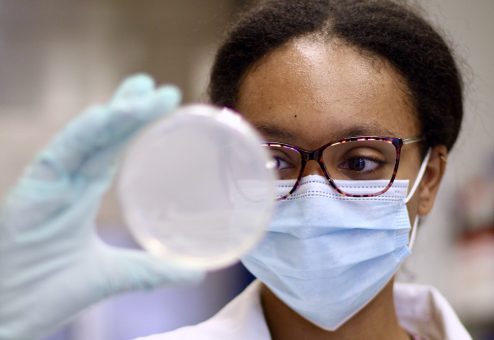
“The Chancellor’s Science Scholars program does not exist to give underrepresented minorities a chance — that is not the correct way to look at it,” said Richard Watkins ’14, Ph.D., program coordinator for CSS.
“What we are doing is creating the best scientists the world has ever seen, and there is not a certain look to that. There is no rhyme or reason to who ends up being the best — you don’t know who will have that breakthrough that’s going to save the world.”
Take UNC-Chapel Hill graduate Kizzmekia Corbett ’14, Ph.D., the National Institutes of Health’s lead scientist for coronavirus research. Corbett, one of the world’s top researchers, helped develop a COVID-19 vaccine. She earned her B.S. from the University of Maryland, where she was a Meyerhoff Scholar — the model for the Chancellor’s Science Scholars program.
“If it weren’t for the Meyerhoff program, we might not even have hope right now,” Watkins emphasized. “We are in a time when science is as important as the military to our national security. By investing in these scholars, we are investing in our future.”
CSS has existed for less than a decade and is already mirroring and building on the success of the Meyerhoff program, which began in the 1980s. In 2019, the journal Science highlighted UNC-Chapel Hill for replicating its success.
Like the Meyerhoff program, CSS prepares students to pursue graduate degrees in STEM disciplines, offering merit-based scholarships, opportunities to participate in cutting-edge research, professional development, leadership training, mentorship and other programming.
CSS fosters diversity in research programs and careers by nurturing and supporting students of all backgrounds. Because of this nurture and support, the retention rate for Chancellor’s Science Scholars pursuing degrees in science, technology, engineering and math is 90% — compared to Carolina’s 38% average overall. These scholars have higher average GPAs than their UNC peers, and 100% participate in cutting-edge research at Carolina and beyond.
The nurture and support begins before students set foot on campus. A six-week immersion program, called the Summer EXCELerator, enables them to get acquainted with campus buildings and resources while building strong connections with their fellow cohort members, who form the basis of the program’s support network.

“My best and closest friends are CSS members,” said Chancellor’s Science Scholar Jasmine Akoto ’22, who participated in a summer research program at Johns Hopkins University in the summer of 2020.
“If it wasn’t for this program, would I have built all these relationships that I have now? These are people who are like me; they have the same goals in life. We might make different career choices, but we all have the same goal to become successful, especially as minorities and people who are not seen as much within these fields.”
Watkins is also critical to the program’s success. As program coordinator, he does everything from recruitment and fundraising to cultivating partnerships and establishing internships and research opportunities for the students. He and Noelle-Erin Romero ’16, Ph.D., meet monthly with scholars to provide encouragement and ensure they have everything they need to succeed.
“What I like most about working with CSS is selfish,” said Watkins. “The students are so talented and so diverse that each one makes some aspect of me better. These are the smartest people we can find, hands down, and I get to talk with them about their dreams, their aspirations and help them with their struggles. I have learned so much from them, and I am grateful for that.”
Watkins stressed that at the end of the day, the ultimate goal of CSS is to create scientists who will save, improve and extend lives.
“The least we can do is make sure the scholars aren’t burdened and saddled with financial hardships because of education. By 2022, I want every single scholar to have a full ride at Carolina. I don’t want to lose out on any talent to another school on the basis of finances.”
Learn more about the Chancellor’s Science Scholars program.
